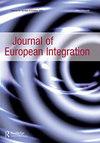Governing Global Spaces: the roles of the European Union and other major powers
IF 3.1
1区 社会学
Q1 INTERNATIONAL RELATIONS
引用次数: 0
Abstract
ABSTRACTThis article offers a comparative assessment of the current roles of the European Union (EU) in the governance of the Global Spaces − the atmosphere, the high seas, the poles, outer space, and cyberspace. It does so from a twofold perspective: first, it compares the EU’s capacity to act and roles across the Global Spaces, drawing on actorness and role theory. Second, to contextualize the EU’s roles, it contrasts them with those of the United States, China and Russia. The findings show that the EU is still in the process of calibrating its roles in the governance of most of these Global Spaces. It is primarily a norm defender, which distinguishes its external action from the more competitive approaches of other major powers. The EU’s recent attempt to become more strategic has, for now, led to a gap between its role conception and performance, largely due to its limited actorness.KEYWORDS: ActornessatmospherecyberspaceEuropean UnionGlobal Spaceshigh seasouter spacepolar regionsrole theory Disclosure statementNo potential conflict of interest was reported by the authors.治理全球空间:欧盟和其他大国的角色
摘要本文对欧盟(EU)在全球空间(大气、公海、极地、外层空间和网络空间)治理中的当前角色进行了比较评估。它是从两个角度来做的:首先,它比较了欧盟在全球空间中的行动能力和角色,借鉴了行动者和角色理论。其次,为了将欧盟的角色置于大背景下,本文将其与美国、中国和俄罗斯的角色进行了对比。调查结果表明,欧盟仍在调整其在大多数全球空间治理中的角色。它主要是规范的捍卫者,这使它的对外行动有别于其他大国更具竞争性的做法。欧盟最近试图变得更具战略性,但就目前而言,这导致了其角色概念与表现之间的差距,这主要是由于它的角色有限。关键词:行动者大气网络空间欧盟全球空间高纬度外层空间极区角色理论披露声明作者未报告潜在利益冲突。
本文章由计算机程序翻译,如有差异,请以英文原文为准。
求助全文
约1分钟内获得全文
求助全文

 求助内容:
求助内容: 应助结果提醒方式:
应助结果提醒方式:


